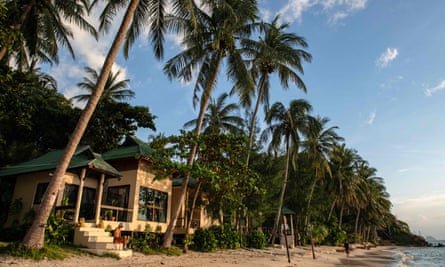Work therapy: can a cyber-commuter prepare a retail employee for life as a digital nomad?
5 min readWe started a revolution from our beds during lockdown and now it’s spreading to the beach resorts. Having realised that remote working is entirely possible, many people are taking that ethos abroad. A 2021 report from Airbnb showed that 11% of the company’s long-term-stay bookers were living a nomadic lifestyle and 5% planned to give up their main homes.
Barbados, Malta, Iceland, Bermuda, Spain, Croatia, Greece, Estonia, Sri Lanka and Indonesia (specifically Bali) are among the countries setting up digital nomad visas and similar schemes for remote workers.
But how does someone who has never been a freelancer, let alone worked overseas, prepare for such a dramatic lifestyle change?

The case: Luisa Tulouna works at Victoria Market in Melbourne, selling chicken. She’s studying digital marketing, web development and copywriting, as well as Tesol (teaching English as a second language), with the idea of freelancing or teaching while immersing herself in combat sports overseas.

The expert: Diego Bejarano Gerke is the CEO of WiFi Tribe, a community of more than 1,000 digital nomads from 63 countries who travel together. The logistics of living in each country are sorted by chapter hosts employed by WiFi Tribe. He is also the co-founder of Beach Commute, an online course aimed at getting people into remote work.
The session
Diego is in Bali when we Zoom and he’s wearing a nice pair of cans, essential for the digital nomad. He tells Luisa he finds her quest relatable – he gave up working on startups (“failing miserably”) in favour of being a freelance marketer himself.
WiFi Tribe began in 2016 when Diego invited a group of friends to work at a house his parents owned in Bolivia. Gradually that group became more nomadic, eventually morphing into a formalised arrangement that accumulates newcomers as they go.
Luisa wants to pursue her passion in muay thai and Brazilian jiu-jitsu, which might take her to Thailand, Brazil or the Netherlands. Her interest in combat sports has been lifesaving. “It has helped deepen my desires for personal growth and the constant challenges are enough to give anyone purpose and drive,” she says. Learning about the cultures of the country she visits through both martial and traditional arts would be “the ultimate way of living”.
Before she leaves, Luisa plans to save enough for five months of living – about A$9,500 by her estimation. Diego agrees. He thinks people need a minimum of three months’ living capital, plus enough money to fly home in an emergency.
“If you go on Nomad List, you can just search for the destinations and they’ll tell you what the cost of living is there, as well as the ‘livability’,” he says. “I would take that with a pinch of salt because you can usually live cheaper.”
Diego advises Luisa to avoid any location that’s touristy, since the cost of living is higher. Koh Phangan in Thailand has a healthy digital nomad community, as does Florianopolis in Brazil. The Netherlands would be much more expensive. Arriving off-season will cut down costs too.

Luisa will immediately have a sporting community because she’ll join a fight gym. To find a working community, Diego recommends searching for digital nomad groups on Facebook and following threads on Reddit, as well as finding a coworking space that emphasises community building.
He says it will realistically take a good month for Luisa to find her feet and she’ll likely be distracted by touristy stuff. For this reason, it’s best to move somewhere for a minimum of three months.
“The first week, I would probably just look around at the gym that you’re going to be at,” he says. “Decide whether you need a coworking space or which cafe is the right spot for you to work from.” Diego says she should make sure her accommodation has a desk and good internet “as backup”.
Most digital nomads use Airbnb, but paid community couch-surfing services could be “worth trying out”, Diego says. “I wouldn’t recommend a hostel because most people there are in a different phase of life, trying to party while you’re trying to work.”
It’s smart to sweat the small stuff before you arrive. “Get health insurance, get travel insurance and get a few different credit or debit cards because you will inevitably lose some or they will be blocked.” Diego also recommends international banking systems such as Revolut and Wise. “They allow you to do currency exchanges at probably the best rates.”
For Luisa to touch down work-ready, Diego tells her to make sure her phone isn’t locked to one provider and buy a sim card as soon as she lands. “Get 30GB of data [with the sim] so that if there’s an internet outage, you get to keep working by using your phone as a hotspot,” Diego says. It’s even worth bringing a pocket wifi router like GlocalMe in case she can’t get to a sim shop.
As for the actual work, he warns that getting a job locally – such as in retail or hospitality – often isn’t an option. Tax rules and visa requirements vary from country to country too.
Diego recommends Luisa starts building a marketing and copywriting portfolio immediately using a platform such as Upwork or Fiverr. “I started my marketing with a family contact and asked if I could learn on the job and only charge him for half the time, then I went to Upwork to put myself on there too,” he says.
Getting good reviews now will be vital to attracting new clients. “If you do have a first client that you’re working with, ask them to bill you through Upwork,” Diego says. “You’re going to lose some money through it [Upwork takes between 5% and 20%], but what’s more important is you’ll establish a portfolio and they’ll be giving you a review at the end of that. Just make sure they give you a review. The same goes for teaching English – you can also put that on there.”
There are plenty of platforms for finding remote work (some are free and some have a subscription system): Remote Jobs for Digital Nomads; Digital Nomads World; Pangian, We Work Remotely, Flexjobs and Just Remote.
One warning though: it’s common that freelancers go through phases of feast and famine, which is why those three months of saved expenses are so important.
Luisa’s takeaways
Luisa has joined Nomad List and Diego signed her up to Beach Commute for free.
“Phase one is the preparation stage,” she says. “I need to knuckle down more with my studies before I get sidetracked by all the potential jobs I could get.”
“Phase two is building the portfolio, working for free or cheaply to get a foot in the door, and phase three is figuring out where I’m going and what I need to do to be in that country legally.”



